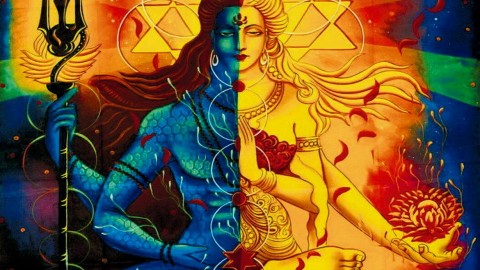The Crescendo – In Gita Verse 7.28 Persons who have acted piously in previous lives and in this life and whose sinful actions are completely eradicated are freed from the dualities of delusion, and they engage themselves in My service with determination.
Krishna says that those who have known that life recurs again and again, that one is born and then dies countless numbers of times, that the chain of arrivals and departures is almost endless. They realise that to come out of the vicious circle of life and death we need to understand death not life. Once they understand death they take a jump into eternal life.
Once the person has known the death he becomes non-dual. As he has experienced death and life is not separate. It is just a process.
What is the Zen attitude towards death?
Laughter. Yes, laughter is the Zen attitude towards death and towards life too, because life and death are not separate. Whatsoever is your attitude towards life will be your attitude towards death, because death comes as the ultimate flowering of life. Life exists for death. Life exists through death. Without death there will be no life at all. Death is not the end but the culmination, the crescendo. Death is not the enemy, it is the friend. It makes life possible.
So the Zen attitude about death is exactly the same as is the Zen attitude towards life – that of laughter, joy, celebration. And if you can laugh at death, in death, you are free from all. Then you are, freedom. If you cannot laugh at death you will not be able to laugh in life either because death is always coming. Each act in life, each move in life, brings death closer. Each moment that you live you get closer to death. If you cannot laugh with death, how can you laugh with life and in life?
But there is a difference between Zen Buddhists and other religions. Other religions are not that deep: other religions also say that there is no need to fear death because the soul is immortal. But in the very idea of the immortality of the soul, your mind is seeking eternity and nothing else. In the very idea of immortality you are denying death, you are saying there is no death. You are saying, “So why be afraid? There is no death. I am going to live – if not as this body, still I am going to live as this soul. My essential being will continue. So why fear death? Death will not be destroying me. I will remain, I will persist, I will continue.” The other religions compromise with your desire to remain forever, they give you consolation. They say, “Don’t be worried. You will be in some other body, in some other form, but you will continue.” This seems to be clinging.
But the Zen approach towards death is utterly different, immensely profound. Other religions say death is not to be worried about, not to be feared, because the soul is eternal. Zen says: There cannot be any death because you are not. There is nobody to die. See the difference – there is nobody to die. The self exists not, so death cannot take anything away from you. Life cannot give you anything and death cannot take anything away. There is no purpose in life and no purpose in death. There is nobody to die. Other religions say you will not die so don’t be worried about death. Zen says: You exist not – for whom are you worrying? There is nobody in life and there will be nobody in death; you are pure emptiness. Nothing has ever happened there.
Man’s journey to nothingness: Man is a crossroads, where four ways meet. The first way is that of matter. The atheist takes that road, the scientist takes that road: “Man is nothing but matter.”
The second road defines man as a duality between matter and mind. Most of the philosophers of the world have chosen that definition because it seems completely rational.
The third possibility, which has been accepted by all religions, is that man is not just a matter or just mind; he is also a soul. Matter is his outer expression, soul is his inner expression, and mind functions as a bridge between the two. On the third path there is a possibility of a life beyond death. The people who have accepted it have created on this foundation the idea of reincarnation: birth after birth, one changes houses but the essential soul remains.
Zen has a fourth standpoint. Man is not matter, although he is covered with matter. He is not mind, although he is covered with mind. Nor is he an individual soul. He is a pure nothingness. Man, from this fourth standpoint, which is the standpoint of Zen, is almost like an onion. You go on peeling it, one layer after another layer, hoping that you are going to find something. Finally, when you have peeled all the layers off, your hands are full of emptiness; nothing is left. The onion was only layers and layers and layers and layers. Behind those layers was emptiness, nothingness, which will not be visible to the eyes, which will not be tangible to the hands.
Zen has taken the ultimate standpoint about man, you cannot go beyond that. Here ends the whole journey, the pilgrimage of the seeker.
Krishna says – You touch this nothingness when you are deep in your being, because that being is already rooted in this nothingness. You are driving your life, moment to moment, from that nothingness. then you engage in My service with determination.
Tags: The Crescendo





